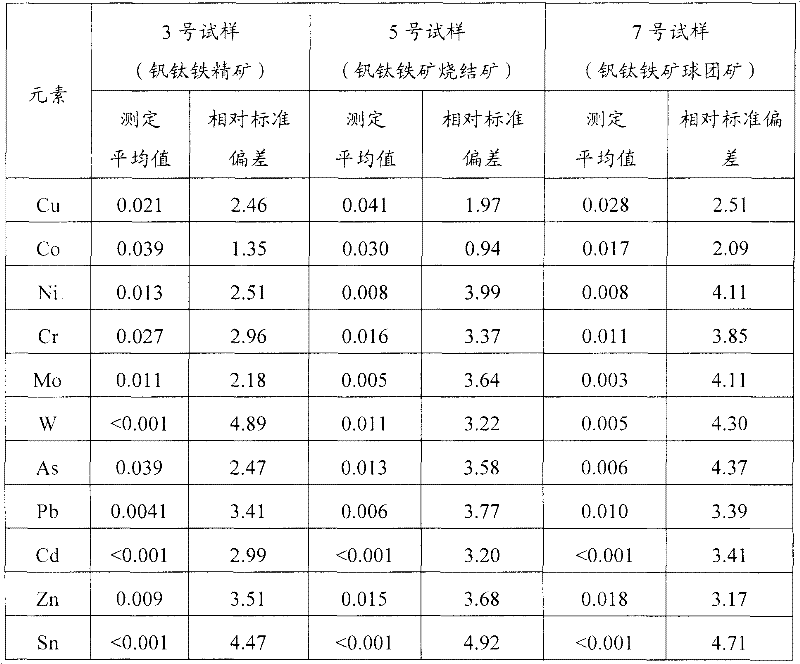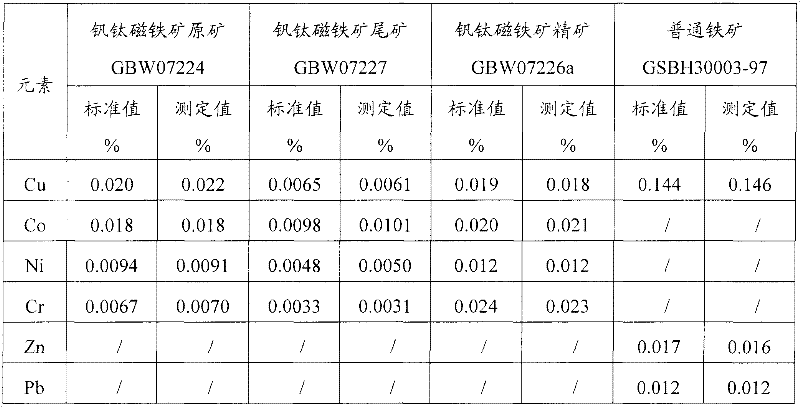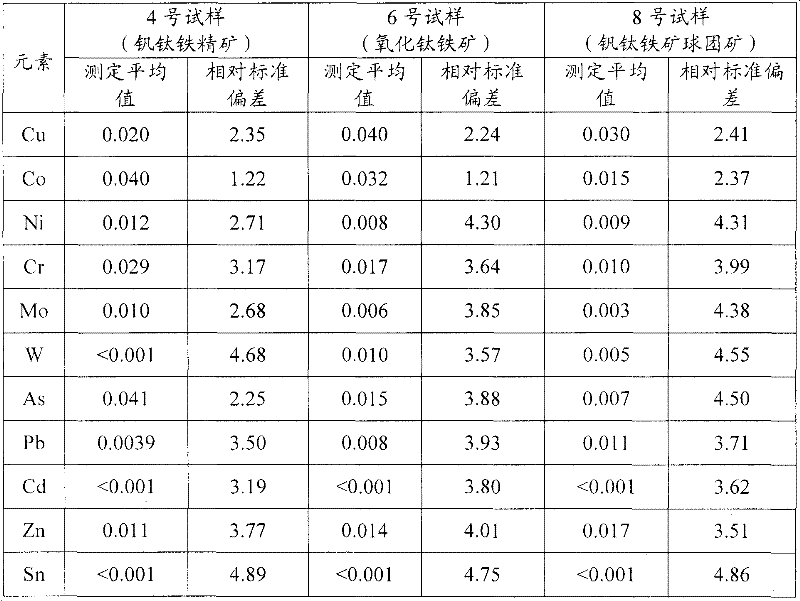Digestion method and detection method of iron ore
A detection method and technology for iron ore, which are applied in the preparation of test samples, thermal excitation analysis, material excitation analysis, etc., can solve the problems of complex matrix, interference accuracy, explosion risk, etc. Error, effect of less reagent dosage
- Summary
- Abstract
- Description
- Claims
- Application Information
AI Technical Summary
Problems solved by technology
Method used
Image
Examples
Embodiment 1
[0033] The iron ore digestion method according to one aspect of the present invention comprises the steps: (1) placing the iron ore to be tested in a container, adding hydrofluoric acid and nitric acid into the container, sealing the container, and then using microwaves for the first Once digested, a suspension is formed; (2) the suspension is transferred to another container, and perchloric acid is added to the other container, and then the other container is heated in an open system, and then added to the other container Add hydrogen peroxide into the other container to use the nitric acid remaining in the suspension and the added perchloric acid and hydrogen peroxide to digest the residue in the suspension for the second time, so as to obtain a completely digested solution .
[0034] According to the digestion method of iron ore on the one hand of the present invention, hydrofluoric acid and nitric acid consumption can be according to the quality of iron ore to be measured ...
example 1
[0045] The hydrofluoric acid, nitric acid, perchloric acid, hydrogen peroxide and water used in this example are all of superior grade. The microwave digestion system used is Mars5 produced by CEM Company of the United States, and the ICP-AES is iCAP6300 of Thermo Fisher Corporation of the United States. Inductively coupled plasma atomic emission spectrometer.
[0046] Digestion of vanadium ilmenite
[0047] In this example, the sample to be tested is the ore sample of vanadium-titanium iron ore (produced by Panzhihua Iron and Steel Group) (hereinafter referred to as No. 1 sample), and its main components include: TiO 2 =9.0%, V 2 o 5 =0.3%, Al 2 o 3 =10%, Fe=26%.
[0048] Weigh 0.2500g vanadium-titanite raw ore sample in the microwave digestion inner tank, first add 1.0 mL of concentrated hydrofluoric acid (HF) with a mass percentage concentration of 40% and a mass percentage concentration of 65% along the inner tank wall concentrated nitric acid (HNO 3 ) 3.5mL. The...
example 2
[0053] In this example, the sample to be tested is the ore sample of vanadium-titanium iron ore (produced by Panzhihua Iron and Steel Group) (hereinafter referred to as No. 2 sample), and its main components include: TiO 2 =11%, V 2 o 5 =0.5%, Al 2 o 3 =10%, Fe=33%. In addition, in this example, except that the mass of the sample is 0.1000 g, the reagent dosages are: 1.0 mL of concentrated HF with a concentration of 47% by mass, concentrated HNO with a concentration of 68% by mass 3 3.0mL, concentrated perchloric acid 1.0mL, H 2 o 2 0.6mL and (1+2) dilute hydrochloric acid 15.0mL. The microwave heating program is set to raise the temperature of the material in the container to 190°C in 5 minutes, and then keep it warm for 8 minutes. The rest of the steps and parameters are the same as those in Example 1. Through the observation of the sample digestion results, it was found that the obtained digestion solution was clear and free of residues.
PUM
 Login to View More
Login to View More Abstract
Description
Claims
Application Information
 Login to View More
Login to View More - R&D
- Intellectual Property
- Life Sciences
- Materials
- Tech Scout
- Unparalleled Data Quality
- Higher Quality Content
- 60% Fewer Hallucinations
Browse by: Latest US Patents, China's latest patents, Technical Efficacy Thesaurus, Application Domain, Technology Topic, Popular Technical Reports.
© 2025 PatSnap. All rights reserved.Legal|Privacy policy|Modern Slavery Act Transparency Statement|Sitemap|About US| Contact US: help@patsnap.com



